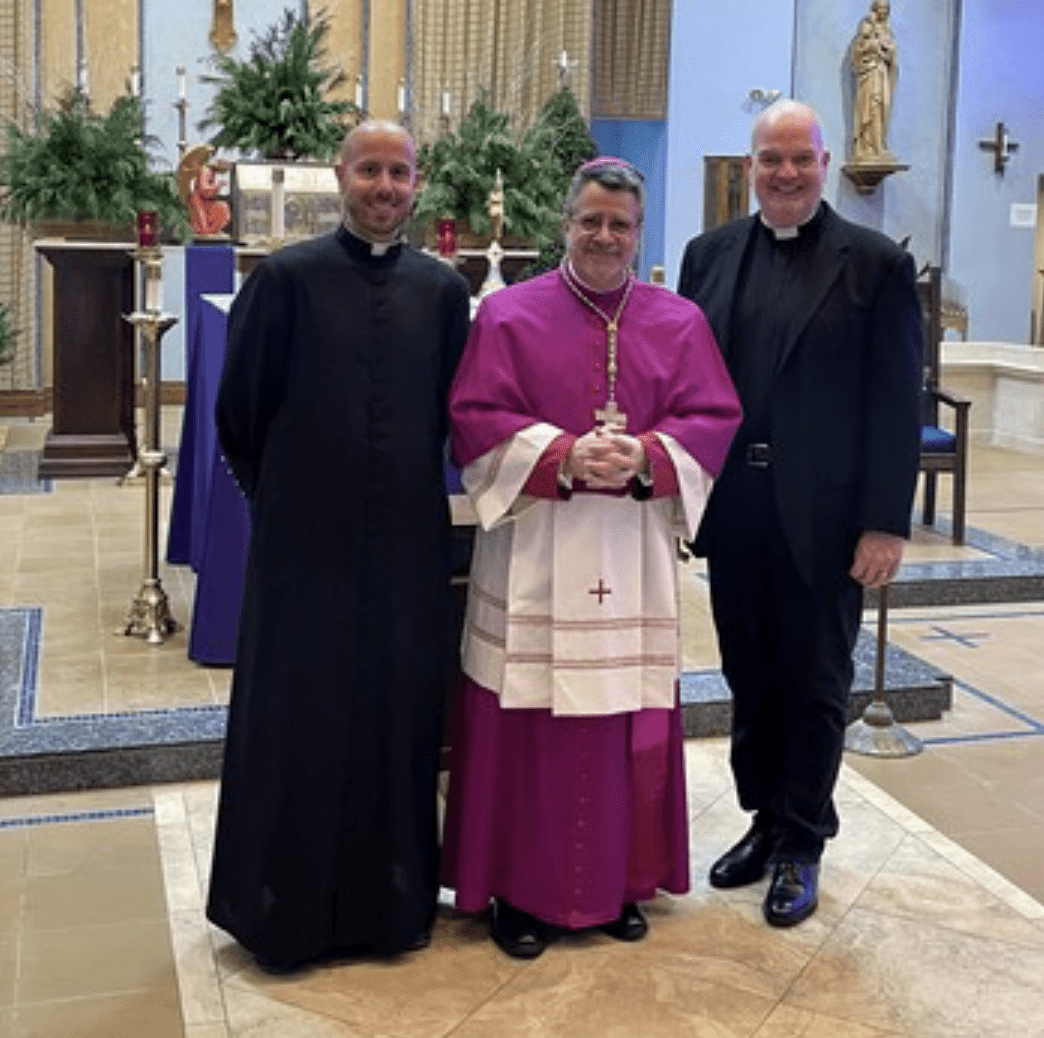Bishop Lorenzo encourages participants of retreat ‘be men of hope’
EAST BRUNSWICK — The word “hope” is often not the right word at all, said Auxiliary Bishop Elias R. Lorenzo of the Archdiocese of Newark, during an in-person and online presentation at St. Bartholomew Church.
“How often we use the word ‘hope’ when we mean ‘I would like,’ or ‘I want,’ or ‘I wish,’” he continued. “Hope is a deeper virtue. Delving into the biblical considerations of the word ‘hope’ is more difficult and more profound.”
Bishop Elias served as keynote speaker for the “Being Men of Hope” retreat held Dec. 19. The retreat included an examination of the Biblical meaning of hope in the Old and New Testaments, Eucharistic adoration, opportunities for the sacrament of reconciliation and an evening Mass.
Bishop Elias serves as the regional bishop of Union County for the Newark Archdiocese. A Benedictine monk of St. Mary’s Abbey, Delbarton, he made his first profession of vows in 1985; was ordained a priest in 1989 and was consecrated a Bishop for the Archdiocese this past July. He holds a master’s degree in liturgical theology from St. John’s University, Collegeville, Minn.; a master’s degree in counseling psychology from Seton Hall University, South Orange, and a licentiate in canon law from The Catholic University of America, Washington, D.C. Following his service as prior of the Abbey, he served as vicar for Religious for the Diocese of Metuchen.
The Book of Psalms is filled with examples of hope, Bishop Elias noted.
“Psalms 42 and 43 show that hope is tied to God’s intervention and saving presence,” he said. “There is a longing for God’s intervention in captivity and deliverance, and the psalmist distinguishes between hope and optimism: optimists see that life’s troubles may have a positive outcome, while hope is a virtue.
“Believing and trusting in God is essential… Hope has confidence in God’s fidelity; we cannot see the future, but can only imagine it,” Bishop Elias said. “Hope places trust in God’s ways and purpose for our lives.”
The exhortation to trust in God is good advice even today, he said. Quoting the prophet Isaiah (40-31), the bishop explained, “‘They that hope in the Lord will renew their strength, they will soar on eagles’ wings.’
“Faith could give way to hope: is there some parallel to the present divisions in society and the crisis in the Church? Scriptures suggest we move forward. We become ambassadors of hope.”
Bishop Elias reminded his audience that hope is mentioned in each celebration of the Mass when the priest declares, “We wait in joyful hope for the coming of our Savior, Jesus Christ.”
“Hope carries a special message,” he said. “We are tasting that hope when we come to the altar to be fed with the very life of the risen Christ… Hope challenges us to see with eyes of faith, it is about God’s redemptive action in Jesus Christ. The salvific experience in our human experience can give rise to great faith and acts of love.”
Hope flows from the resurrection of Christ as well, Bishop Elias said, noting, “Christ’s resurrection brought redemption, forgiveness of sins and promise of eternal life once and for all. Because we believe in something so marvelous, we have authentic hope. Amidst all the challenges of life, we place our hope and trust in Christ. This gives us solid, authentic, unbridled hope.”
Chapter 15 of St. Luke’s gospel recounts the story of the two disciples on their way to Emmaus following the crucifixion of Christ. Noting the passage was “one of the most mysterious but hopeful scenes in the gospels,” Bishop Elias described how the two distraught disciples regain their hope when they meet Christ along the road and only recognize him in the breaking of the bread.
“They had hoped that Jesus would bring about significant changes in their lives,” he said. “This opens an important dimension for reflection on our personal goals. We can live so strongly in the present that we fail to recall the past, especially the mysterious and confusing things we hear. How often do we get the truer meaning of something only after we pray?
“The journey is significant,” Bishop Elias concluded. “If we are with Christ, we, too, are on a journey. The Christian life is a life of hope, with the presence of the risen Lord walking with us all along the way. This is reason for hope.”
This article originally appeared in the Catholic Spirit, and was reprinted here with permission.



